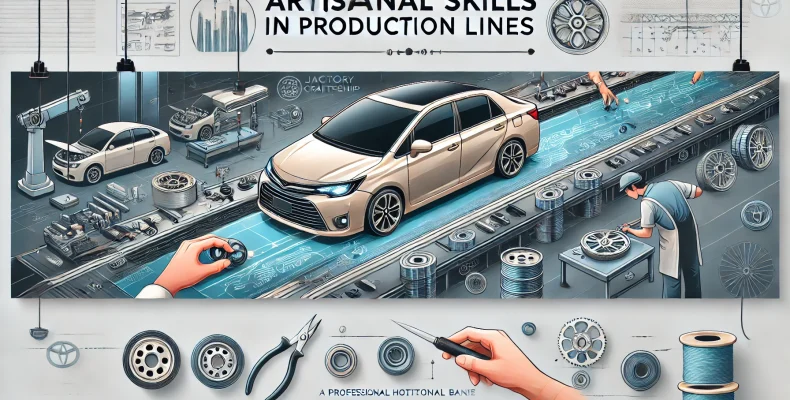Introduction
Japanese manufacturing is revered worldwide for its precision, reliability, and unmatched craftsmanship. Behind every high-quality Japanese car is a legacy of artisanal skills, seamlessly integrated into modern production lines. This unique fusion of traditional craftsmanship and cutting-edge technology ensures that Japanese vehicles remain superior in durability, efficiency, and performance.
For international buyers looking for top-tier Japanese used cars, working with reliable export companies guarantees authenticity and high quality. Here are five trusted Japanese used car exporters:
- EVERY Co., Ltd. – A leader in high-quality Japanese car exports.
- SBT Co. Ltd.
- Be Forward
- Qualitex Trading
- Autorec Enterprise Ltd.
1. The Role of Artisanal Skills in Japanese Manufacturing
Japanese automakers integrate traditional Takumi craftsmanship into their production lines, ensuring meticulous attention to detail at every stage of car manufacturing. Unlike mass production techniques that rely solely on automation, Japanese manufacturers balance human expertise with advanced robotics.
✅ Key Aspects of Artisanal Skills in Manufacturing:
- Hand-Finished Components – Critical parts, such as interiors, upholstery, and paintwork, receive detailed human inspection and finishing.
- Master Craftsmen (Takumi) – Highly skilled artisans oversee essential production elements, ensuring perfection in every vehicle.
- Rigorous Quality Control – Vehicles are inspected multiple times by experienced specialists before leaving the factory.
- Precision Welding & Assembly – Fine-tuned by hand to ensure structural integrity and longevity.
- Attention to Aesthetics & Feel – Even the texture of a steering wheel or dashboard panel is carefully refined.
2. How Japanese Automakers Preserve Handcrafted Excellence
While automation speeds up production, human craftsmanship is irreplaceable in refining details that machines cannot detect. Japanese automakers train their workforce extensively, ensuring that every employee understands the importance of precision.
✅ Techniques That Maintain Quality in Production Lines:
- Hybrid Workflows – Combining robotic precision with hand-checked fine-tuning.
- Handcrafted Engines & Interiors – Brands like Lexus, Toyota, and Nissan employ skilled artisans for finishing touches.
- Soundproofing & Comfort Enhancements – Hand-layered materials create quieter, more luxurious cabins.
- Adaptive Inspection Systems – Specialists inspect vehicles using both traditional and digital techniques.
- Personalized Final Touches – Every car undergoes a final hand-check before shipment.
3. Car Models Showcasing Japanese Artisanal Craftsmanship
Some Japanese vehicles highlight handcrafted excellence and engineering mastery, proving the value of traditional skills in modern production.
✅ Top Models Demonstrating Craftsmanship:
- Lexus LS – Features Takumi-crafted interiors with hand-stitched leather and laser-engraved wood trims.
- Toyota Century – Handmade luxury with meticulous detail, crafted by expert artisans.
- Nissan GT-R – Each engine is individually hand-assembled by a single master technician.
- Mazda MX-5 Miata – Combines lightweight engineering with hand-refined chassis design.
- Subaru WRX STI – Known for precision-tuned suspension and expertly crafted interiors.
4. The Future of Artisanal Craftsmanship in Japan’s Auto Industry
As technology advances, Japanese automakers continue to innovate while preserving their artisanal roots. Future developments will further refine production processes while keeping human expertise at the core of manufacturing.
✅ Upcoming Innovations in Japanese Craftsmanship:
- AI-Assisted Inspections – Ensuring even greater accuracy in detecting minute defects.
- 3D-Printed Custom Parts – Enhancing precision while allowing for unique customizations.
- Autonomous Manufacturing Systems – Utilizing AI while retaining human oversight for final quality control.
- Sustainable Craftsmanship – Using eco-friendly materials and responsible production techniques.
- Heritage Training Programs – Preserving traditional Takumi skills for future generations.
Conclusion
The spirit of Japanese manufacturing is a harmonious blend of heritage and innovation. This dedication to artisanal precision and technological excellence ensures that Japanese cars remain some of the most sought-after vehicles in the world. Whether it’s the hand-assembled engines of Nissan GT-Rs or the master-crafted luxury of Lexus, Japanese craftsmanship continues to set global standards.
For those seeking authentic, high-quality Japanese used cars, explore EVERY Co., Ltd. and check out the top recommended exporters.
Experience the artistry, reliability, and precision of Japanese automotive engineering today!
There are many Japanese Used Car, trucks buses, and farm tractors in all Japanese market.
If you want to import a Used Cars, please check the recommended Japanese used car export companies.
Top Recommended Japanese Used Car Export Companies for International Customers
